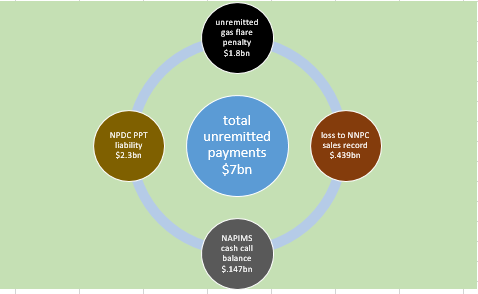Some major outstanding remediation issues in the 2014 oil & gas sector audit
- $7bn total unremitted payments to government
- $1.8bn accumulated unremitted gas flare penalty
- $2.3bn outstanding NPDC PPT liability
- $.147bn Cash Call balance from NAPIMS
- $.439bn loss to non-consistent NNPC sales record
Since 2003 when Nigeria voluntarily signed up for, and began implementing the principles of the global Extractive Industries Transparency Initiative (EITI) in 2004, the nation’s oil and gas industry has, no doubt, moved in leaps and bounds in terms of openness, but the job is far from done.
The Nigerian oil industry, once shrouded in opacity with an alleged high level corruption, have given way to some level of transparency and accountability so much so that the ordinary Nigerian now have basic understanding of the sectors operations.
The Nigerian Extractive Industries Transparency Initiative (NEITI) which is backed by law and tasked with the responsibility of implementing the EITI principles in Nigeria have in essence gone over and beyond the requirements of the global body in efforts to enthrone improved transparency in the sector to ensure maximal benefit from extractive resources for Nigerians.
To this end, the NEITI secretariat have since conducted and published eight circles of audits in the oil sector, covering 1999-2004, 2005, 2006-2008, 2009-2011, 2012, 2013, 2014, and the most recent being the 2015 audit. Each of these audit reports usually contain loads of vital information detailing operations of the sector. Sadly, the draw-back for the NEITI audits however, is the non-implementation of the remediation issues flagged in the reports.
It has become a major concern for industry watchers that year after year, same issues of under payments, under assessment, under remittance, gas flare, discrepancies in amount paid by companies and amount received by government etc., are repeatedly thrown up in the NEITI audit reports.
According to analysts, the challenge is the seemingly lack of interest by relevant government agencies to ensure the implementation of the remediation issues contained in the audits as well as the slow pace towards adopting reforms capable of improving processes, plugging leakages and delivering a more competitive industry.
To this end, participants at a roundtable on the NEITI remediation issues organized by BudgIT in collaboration with the Facility for Oil Sector Transformation (FOSTER), held recently in Lagos, urged the media and Civil Society Organizations (CSOs) to do more in bringing social pressure on government by increasing public awareness and demand for implementation of the NEITI audit findings.
View details: NEITI Remediation Issues (Infographics)
Following an infographics presentation by BudgIT which highlighted outstanding remediation issues of the NEITI 2014 oil and gas sector audit, the participants unanimously agreed that the NEITI should be empowered to impose sanctions in the industry against covered entities that do not comply with the provisions of the Act.
It was also agreed that other partner groups can explore the use of the Freedom of Information (FoI) Act to support NEITI in the push for remediation of highlighted issues in the NEITI reports, noting that the fight is not NEITI’s alone.
Technical Lead, Demand-side Accountability, FOSTER, Dr. Michael Uzoigwe, in his remarks, said, “NEITI has produced numerous industry audit reports yet these reports seem not to be making the desired impact in terms of the remediation of identified issues.”
However, he added “the NEITI Secretariat alone cannot be held responsible… as a multi-stakeholder initiative there are various roles that all key stakeholders are expected to play in the NEITI implementation process in order to ensure success.”
While decrying poor compliance on the part of the companies, he said to evaluate the remedial issues of the 2014 audit report, with a view to identifying issues that were most recently still outstanding, queries were sent to 19 companies out of which only seven responded.
Meanwhile, to further expand the dialogue around remedial issues, NEITI said it will Thursday, in Abuja, hold a CSOs and media consultation.
“The consultation is designed to expose and deepen knowledge of participants on remedial issues. The programme is also expected to provide a platform for CSOs and media to develop action plan to address the issue,” NEITI said in an email to e360.






























